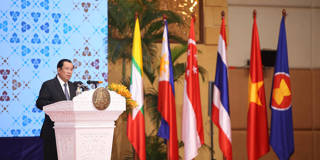During the 2010s, Southeast Asia’s economy was the fastest-growing region in the world, and there were high hopes for political, economic, and socio-cultural integration. But geopolitical shifts have exposed new divisions, and the group’s continued relevance will depend on its ability to set more realistic goals.
BANGKOK – As Cambodia, Indonesia, and Thailand gear up to host major world summits in November, the 55-year-old Association of Southeast Asian Nations is facing an existential crisis, owing to severe internal splits over Russia’s invasion of Ukraine, Myanmar’s military coup, and other issues. The 2007 ASEAN Charter’s vision of deeper political, economic, security, and socio-cultural integration is no more. Salvaging what’s left will require accepting this reality and regrouping accordingly.

BANGKOK – As Cambodia, Indonesia, and Thailand gear up to host major world summits in November, the 55-year-old Association of Southeast Asian Nations is facing an existential crisis, owing to severe internal splits over Russia’s invasion of Ukraine, Myanmar’s military coup, and other issues. The 2007 ASEAN Charter’s vision of deeper political, economic, security, and socio-cultural integration is no more. Salvaging what’s left will require accepting this reality and regrouping accordingly.